Abstract
OBJECTIVE--To determine whether, in the treatment of major depression in primary care, a brief psychological treatment (problem solving) was (a) as effective as antidepressant drugs and more effective than placebo; (b) feasible in practice; and (c) acceptable to patients. DESIGN--Randomised controlled trial of problem solving treatment, amitriptyline plus standard clinical management, and drug placebo plus standard clinical management. Each treatment was delivered in six sessions over 12 weeks. SETTING--Primary care in Oxfordshire. SUBJECTS--91 patients in primary care who had major depression. MAIN OUTCOME MEASURES--Observer and self reported measures of severity of depression, self reported measure of social outcome, and observer measure of psychological symptoms at six and 12 weeks; self reported measure of patient satisfaction at 12 weeks. Numbers of patients recovered at six and 12 weeks. RESULTS--At six and 12 weeks the difference in score on the Hamilton rating scale for depression between problem solving and placebo treatments was significant (5.3 (95% confidence interval 1.6 to 9.0) and 4.7 (0.4 to 9.0) respectively), but the difference between problem solving and amitriptyline was not significant (1.8 (-1.8 to 5.5) and 0.9 (-3.3 to 5.2) respectively). At 12 weeks 60% (18/30) of patients given problem solving treatment had recovered on the Hamilton scale compared with 52% (16/31) given amitriptyline and 27% (8/30) given placebo. Patients were satisfied with problem solving treatment; all patients who completed treatment (28/30) rated the treatment as helpful or very helpful. The six sessions of problem solving treatment totalled a mean therapy time of 3 1/2 hours. CONCLUSIONS--As a treatment for major depression in primary care, problem solving treatment is effective, feasible, and acceptable to patients.
Full text
PDF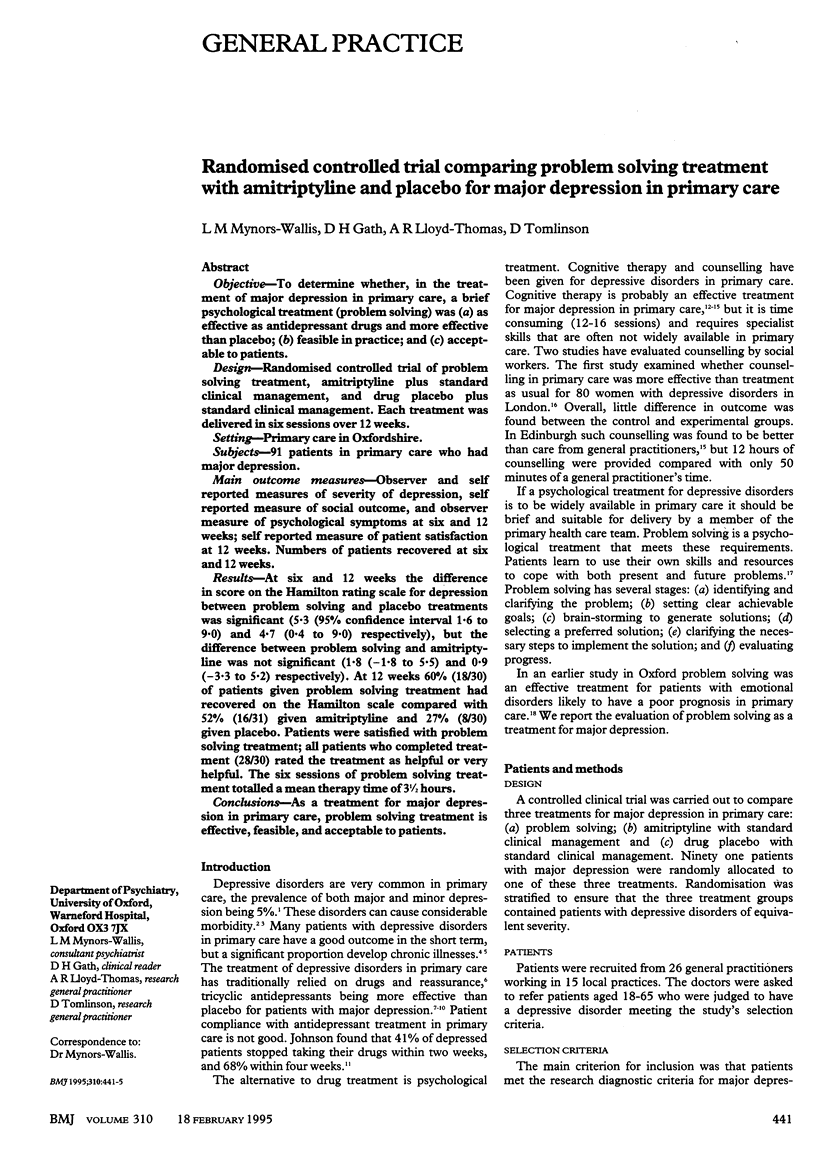
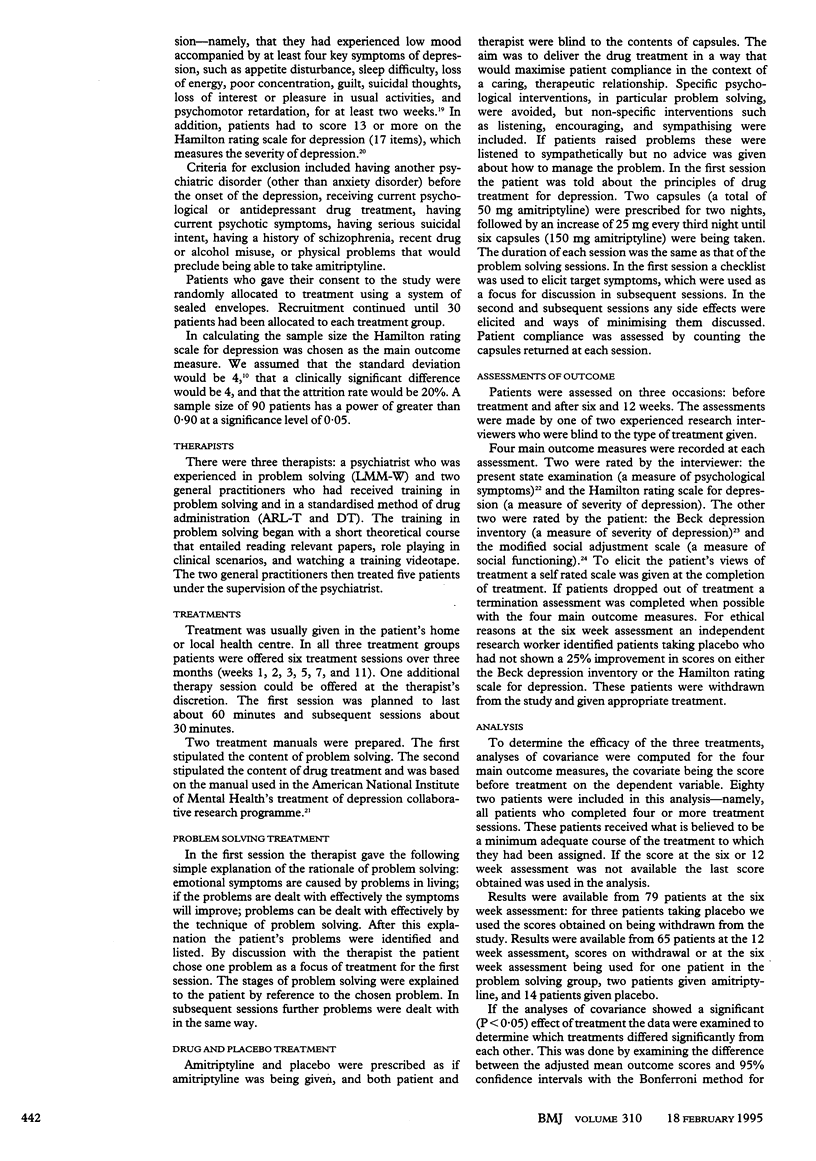
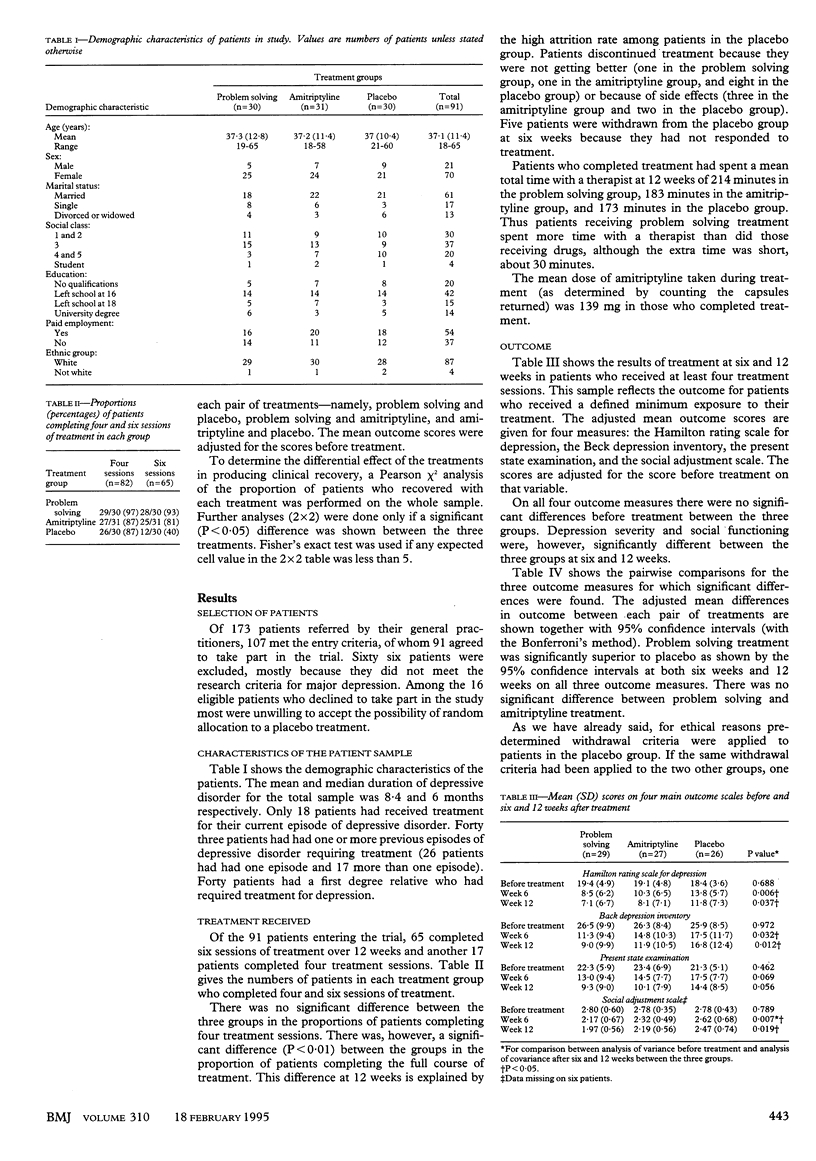
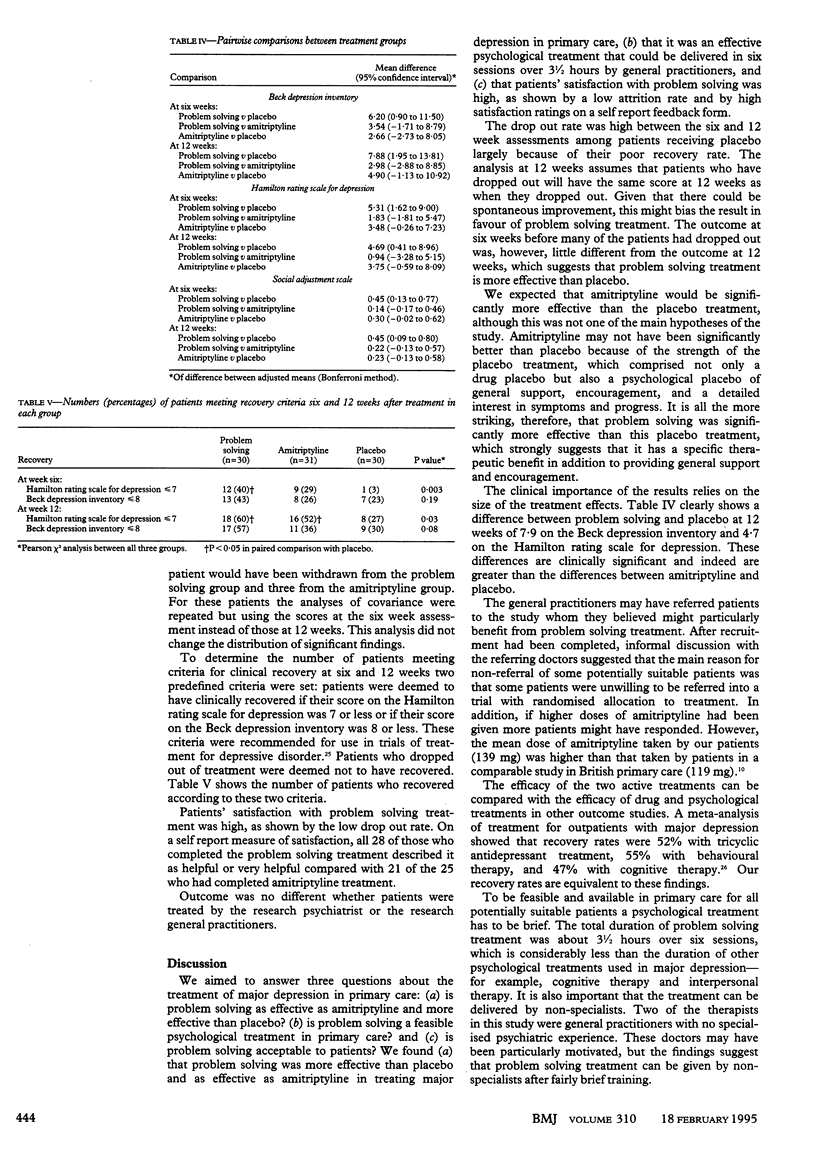
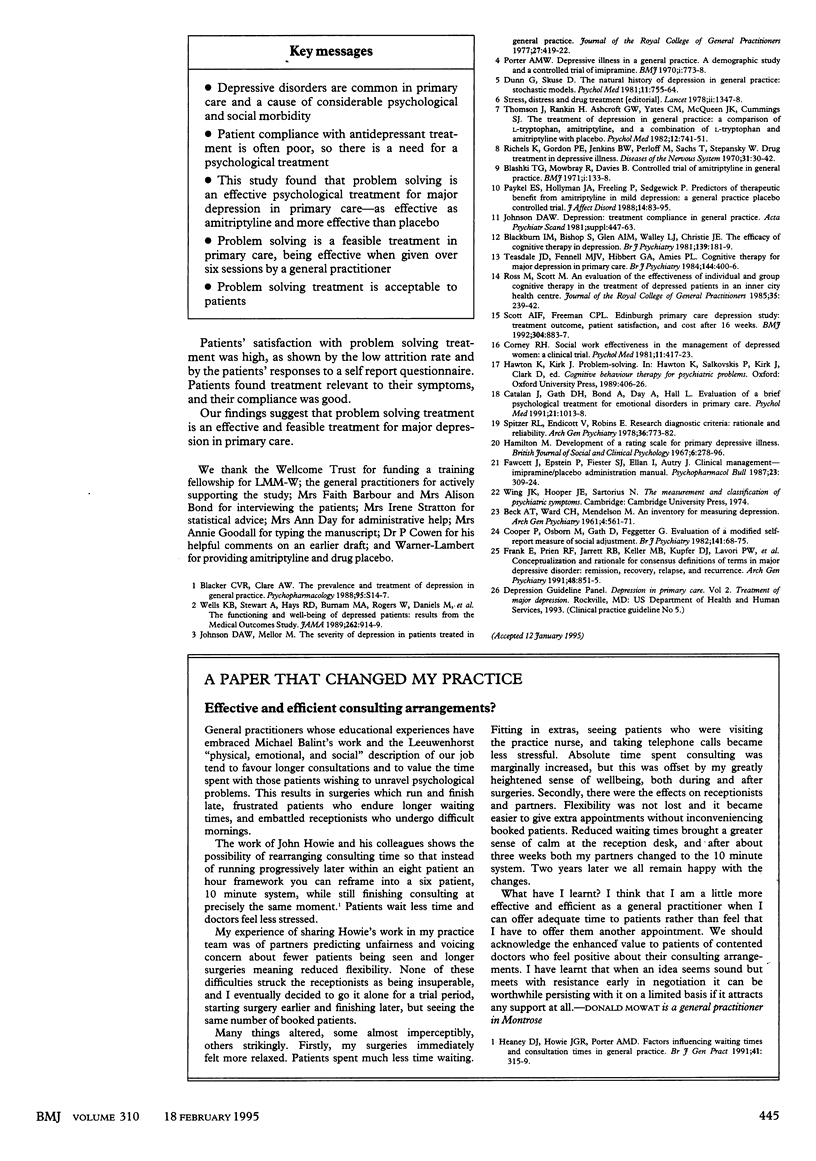
Selected References
These references are in PubMed. This may not be the complete list of references from this article.
- BECK A. T., WARD C. H., MENDELSON M., MOCK J., ERBAUGH J. An inventory for measuring depression. Arch Gen Psychiatry. 1961 Jun;4:561–571. doi: 10.1001/archpsyc.1961.01710120031004. [DOI] [PubMed] [Google Scholar]
- Blackburn I. M., Bishop S., Glen A. I., Whalley L. J., Christie J. E. The efficacy of cognitive therapy in depression: a treatment trial using cognitive therapy and pharmacotherapy, each alone and in combination. Br J Psychiatry. 1981 Sep;139:181–189. doi: 10.1192/bjp.139.3.181. [DOI] [PubMed] [Google Scholar]
- Blacker C. V., Clare A. W. The prevalence and treatment of depression in general practice. Psychopharmacology (Berl) 1988;95 (Suppl):S14–S17. doi: 10.1007/BF00172624. [DOI] [PubMed] [Google Scholar]
- Blashki T. G., Mowbray R., Davies B. Controlled trial of amitriptyline in general practice. Br Med J. 1971 Jan 16;1(5741):133–138. doi: 10.1136/bmj.1.5741.133. [DOI] [PMC free article] [PubMed] [Google Scholar]
- Catalan J., Gath D. H., Anastasiades P., Bond S. A., Day A., Hall L. Evaluation of a brief psychological treatment for emotional disorders in primary care. Psychol Med. 1991 Nov;21(4):1013–1018. doi: 10.1017/s0033291700030002. [DOI] [PubMed] [Google Scholar]
- Cooper P., Osborn M., Gath D., Feggetter G. Evaluation of a modified self-report measure of social adjustment. Br J Psychiatry. 1982 Jul;141:68–75. doi: 10.1192/bjp.141.1.68. [DOI] [PubMed] [Google Scholar]
- Corney R. H. Social work effectiveness in the management of depressed women: a clinical trial. Psychol Med. 1981 May;11(2):417–423. doi: 10.1017/s0033291700052247. [DOI] [PubMed] [Google Scholar]
- Dunn G., Skuse D. The natural history of depression in general practice: stochastic models. Psychol Med. 1981 Nov;11(4):755–764. doi: 10.1017/s003329170004126x. [DOI] [PubMed] [Google Scholar]
- Fawcett J., Epstein P., Fiester S. J., Elkin I., Autry J. H. Clinical management--imipramine/placebo administration manual. NIMH Treatment of Depression Collaborative Research Program. Psychopharmacol Bull. 1987;23(2):309–324. [PubMed] [Google Scholar]
- Frank E., Prien R. F., Jarrett R. B., Keller M. B., Kupfer D. J., Lavori P. W., Rush A. J., Weissman M. M. Conceptualization and rationale for consensus definitions of terms in major depressive disorder. Remission, recovery, relapse, and recurrence. Arch Gen Psychiatry. 1991 Sep;48(9):851–855. doi: 10.1001/archpsyc.1991.01810330075011. [DOI] [PubMed] [Google Scholar]
- Hamilton M. Development of a rating scale for primary depressive illness. Br J Soc Clin Psychol. 1967 Dec;6(4):278–296. doi: 10.1111/j.2044-8260.1967.tb00530.x. [DOI] [PubMed] [Google Scholar]
- Heaney D. J., Howie J. G., Porter A. M. Factors influencing waiting times and consultation times in general practice. Br J Gen Pract. 1991 Aug;41(349):315–319. [PMC free article] [PubMed] [Google Scholar]
- Johnson D. A. Depression: treatment compliance in general practice. Acta Psychiatr Scand Suppl. 1981;290:447–453. doi: 10.1111/j.1600-0447.1981.tb00751.x. [DOI] [PubMed] [Google Scholar]
- Johnson D. A., Mellor V. The severity of depression in patients treated in general practice. J R Coll Gen Pract. 1977 Jul;27(180):419–422. [PMC free article] [PubMed] [Google Scholar]
- Paykel E. S., Hollyman J. A., Freeling P., Sedgwick P. Predictors of therapeutic benefit from amitriptyline in mild depression: a general practice placebo-controlled trial. J Affect Disord. 1988 Jan-Feb;14(1):83–95. doi: 10.1016/0165-0327(88)90075-4. [DOI] [PubMed] [Google Scholar]
- Porter A. M. Depressive illness in a general practice. A demographic study and a controlled trial of imipramine. Br Med J. 1970 Mar 28;1(5699):773–778. doi: 10.1136/bmj.1.5699.773. [DOI] [PMC free article] [PubMed] [Google Scholar]
- Rickels K., Gordon P. E., Jenkins B. W., Perloff M., Sachs T., Stepansky W. Drug treatment in depressive illness. Dis Nerv Syst. 1970 Jan;31(1):30–42. [PubMed] [Google Scholar]
- Ross M., Scott M. An evaluation of the effectiveness of individual and group cognitive therapy in the treatment of depressed patients in an inner city health centre. J R Coll Gen Pract. 1985 May;35(274):239–242. [PMC free article] [PubMed] [Google Scholar]
- Scott A. I., Freeman C. P. Edinburgh primary care depression study: treatment outcome, patient satisfaction, and cost after 16 weeks. BMJ. 1992 Apr 4;304(6831):883–887. doi: 10.1136/bmj.304.6831.883. [DOI] [PMC free article] [PubMed] [Google Scholar]
- Spitzer R. L., Endicott J., Robins E. Research diagnostic criteria: rationale and reliability. Arch Gen Psychiatry. 1978 Jun;35(6):773–782. doi: 10.1001/archpsyc.1978.01770300115013. [DOI] [PubMed] [Google Scholar]
- Teasdale J. D., Fennell M. J., Hibbert G. A., Amies P. L. Cognitive therapy for major depressive disorder in primary care. Br J Psychiatry. 1984 Apr;144:400–406. doi: 10.1192/bjp.144.4.400. [DOI] [PubMed] [Google Scholar]
- Thomson J., Rankin H., Ashcroft G. W., Yates C. M., McQueen J. K., Cummings S. W. The treatment of depression in general practice: a comparison of L-tryptophan, amitriptyline, and a combination of L-tryptophan and amitriptyline with placebo. Psychol Med. 1982 Nov;12(4):741–751. doi: 10.1017/s0033291700049047. [DOI] [PubMed] [Google Scholar]
- Wells K. B., Stewart A., Hays R. D., Burnam M. A., Rogers W., Daniels M., Berry S., Greenfield S., Ware J. The functioning and well-being of depressed patients. Results from the Medical Outcomes Study. JAMA. 1989 Aug 18;262(7):914–919. [PubMed] [Google Scholar]


